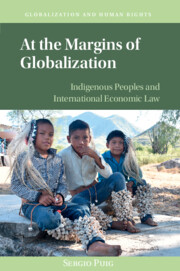Book contents
- At the Margins of Globalization
- Globalization and Human Rights
- At the Margins of Globalization
- Copyright page
- Dedication
- Contents
- Tables
- Preface and Acknowledgments
- Introduction
- 1 Globalization and Its Multiple Discontents
- 2 The Process of Susceptibility and Exclusion
- 3 Indigenous Peoples under International Economic Law
- 4 The Experience of Indigenous Peoples under Economic Regimes
- 5 The Recalibration of Indigenous Rights and Economic Law
- 6 Indigenous Interests and the Future of Economic Treaties
- 7 Toward an Indigenous-Based Critique of Globalization
- Conclusion
- Index
- Series page
2 - The Process of Susceptibility and Exclusion
Published online by Cambridge University Press: 23 April 2021
- At the Margins of Globalization
- Globalization and Human Rights
- At the Margins of Globalization
- Copyright page
- Dedication
- Contents
- Tables
- Preface and Acknowledgments
- Introduction
- 1 Globalization and Its Multiple Discontents
- 2 The Process of Susceptibility and Exclusion
- 3 Indigenous Peoples under International Economic Law
- 4 The Experience of Indigenous Peoples under Economic Regimes
- 5 The Recalibration of Indigenous Rights and Economic Law
- 6 Indigenous Interests and the Future of Economic Treaties
- 7 Toward an Indigenous-Based Critique of Globalization
- Conclusion
- Index
- Series page
Summary
The global ascendancy of neoliberal economics has deepened inequalities between and within nations and largely undermined efforts toward sustainable development. Based on a belief that the market should be the organizing principle for social, political and economic decisions, policymakers in many countries promoted privatization of state activities and an increased role for the free market, flexibility in labor markets and trade and investment liberalization. The benefits of these policies frequently fail to reach the indigenous peoples of the world, who acutely feel their costs, such as environmental degradation, cultural dispossessions and loss of traditional lands and territories. As vulnerable and often marginalized segments of the world’s population, indigenous peoples are at a heightened risk of experiencing the negative consequences of globalization. Understanding this reality could provide pathways for effective interventions to alleviate, overcome or, at the very least, minimize such effects.
- Type
- Chapter
- Information
- At the Margins of GlobalizationIndigenous Peoples and International Economic Law, pp. 23 - 35Publisher: Cambridge University PressPrint publication year: 2021

